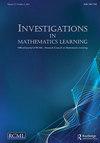Examining Preservice Teachers' Familiarity and Experiences with Mathematical Modeling Practices
Q2 Mathematics
引用次数: 2
Abstract
ABSTRACT Mathematical modeling has been recognized and highlighted in most standards and reports as an important concept to the teaching and learning of mathematics. The study investigated 208 PK–8 preservice teachers’ (PSTs’) familiarity and experiences with mathematical modeling. The study adopted a survey-design perspective to collect data from 10 universities in a mid-western state in the United States of America (U.S.). Data collected were analyzed using both quantitative and qualitative methods. Results from the study indicated that PSTs were familiar with some outcomes related to mathematical modeling practices. However, their familiarity and experiences seem limited, and their perception of mathematical modeling practices were traditional in nature. Most of the PSTs had misconceived definitions regarding mathematical modeling and confused mathematical modeling with model mathematics. Furthermore, most PSTs reported they had no formal exposure or training in practices associated with mathematical modeling during their teacher preparation program. The findings suggest that infusing modeling courses or modules in existing methods or content courses in teacher education programs can be an effective way to elevate PSTs from unfamiliarity of mathematical modeling practices and standards These results along with a supplemental discussion have implications for teacher preparation programs and researchers centered on mathematical modeling education.检验数学建模教师对数学建模实践的熟悉程度和经验
数学建模作为数学教与学的一个重要概念,在大多数标准和报告中得到了认可和强调。本研究调查了208名PK-8职前教师对数学建模的熟悉程度和经验。本研究采用调查设计的方法,从美国中西部某州的10所大学收集数据。收集的数据采用定量和定性方法进行分析。研究结果表明,PSTs熟悉与数学建模实践相关的一些结果。然而,他们的熟悉程度和经验似乎有限,他们对数学建模实践的看法本质上是传统的。大多数pst对数学建模有错误的定义,并将数学建模与模型数学混淆。此外,大多数pst报告说,他们在教师培训计划期间没有接受过与数学建模相关的正式接触或实践培训。研究结果表明,在教师教育计划的现有方法或内容课程中注入建模课程或模块可以有效地提高pst对数学建模实践和标准的不熟悉程度。这些结果以及补充讨论对教师准备计划和以数学建模教育为中心的研究人员具有启示意义。
本文章由计算机程序翻译,如有差异,请以英文原文为准。
求助全文
约1分钟内获得全文
求助全文
来源期刊

Investigations in Mathematics Learning
Mathematics-Mathematics (all)
CiteScore
2.10
自引率
0.00%
发文量
22
 求助内容:
求助内容: 应助结果提醒方式:
应助结果提醒方式:


